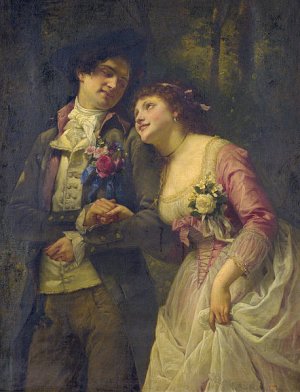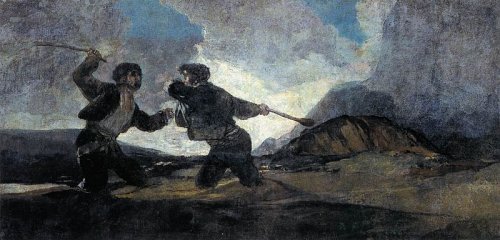
belgard
n. a sweet or loving look

belgard
n. a sweet or loving look

fustigate
v. to strike with a cudgel

noyade
n. a mass execution by drowning
conclamant
adj. crying out together
commorient
adj. dying together or at the same time
J.M.W. Turner’s 1840 painting The Slave Ship recalls a brutal convention in the Atlantic slave trade — an insurance company would reimburse a captain for a slave who was lost at sea, but not for one who died of illness aboard ship. In 1781 Luke Collingwood, captain of the Zong, threw 133 sick and malnourished Africans overboard so that he could claim their value from his insurers. Turner displayed the painting next to lines from his own poem:
Aloft all hands, strike the top-masts and belay;
Yon angry setting sun and fierce-edged clouds
Declare the Typhon’s coming.
Before it sweeps your decks, throw overboard
The dead and dying — ne’er heed their chains
Hope, Hope, fallacious Hope!
Where is thy market now?
Britain had already outlawed its own slave trade when the painting appeared, but its impact encouraged the empire to oppose the institution everywhere.

Curiosities of medical language:
In 2007 a Spanish physician wrote to the New England Journal of Medicine to tell of a 29-year-old patient with acute tendonitis isolated to the right infraspinatus. The doctor traced the problem to the patient’s new Wii videogame, with which he’d played tennis for several hours the previous day. He dubbed the ailment WIIITIS, a word with three consecutive Is. It’s a variant of NINTENDINITIS, a condition that doctors first recognized in 1990.
(Thanks, Bob.)
It is a hard and lengthy task to become acquainted with the vagaries of the language, not to mention the forgotten or altered meanings of many words. Some of these vagaries are aptly illustrated by the story of the Frenchman who said to an American:
I am going to leave my hotel. I paid my bill yesterday, and I said to the landlord, ‘Do I owe anything else?’ He said, ‘You are square.’ ‘What am I?’ He said again, ‘You are square.’ ‘That’s strange,’ said I. ‘I lived so long that I never knew I was square before.’ Then, as I was going away, he shook me by the hand, saying, ‘I hope you’ll be round soon.’ I said, ‘I thought you said I was square; now you hope I’ll be round.’ He laughed and said, ‘When I tell you you’ll be round, I mean you won’t be long.’ Then, seeing me count my change twice over, he said, ‘Are you short?’ I did not know how many forms he wished me to assume: however, I was glad he did not call me flat.
— William S. Bridge, “The English Language,” in The Typographical Journal, March 15, 1902
We’ll begin with box, and the plural is boxes,
But the plural of ox should be oxen, not oxes;
The one fowl is a goose, but two are called geese,
Yet the plural of moose should never be meese;
You may find a lone mouse or a whole nest of mice,
But the plural of house is houses, not hice;
If the plural of man is always called men,
Why shouldn’t the plural of pan be called pen?
The cow in the plural may be cows or kine,
But a bow, if repeated, is never called bine;
And the plural of vow is vows, never vine.
If I speak of a foot, and you show me your feet,
And I give you a boot, would a pair be called beet?
If one is a tooth, and a whole set are teeth,
Why shouldn’t the plural of booth be called beeth?
If the singular’s this and the plural is these,
Should be plural of kiss ever be keese?
Then one may be that, and three would be those,
Yet hat in the plural would never be hose;
And the plural of cat is cats, not cose.
We speak of a brother, and also of brethren,
But though we say mother, we never say methren;
Then the masculine pronouns are he, his, and him,
But imagine the feminine she, shis, and shim.
So the English, I think, you all will agree,
Is the greatest language you ever did see.
— Miscellaneous Notes and Queries, August 1897

GORAN IVANISEVIC alternates vowels and consonants.
filipendulous
adj. hanging by a thread
A cube suspended by a corner casts a hexagonal shadow.

Advance each letter in BANJO four places through the alphabet and you get FERNS:

Advance MANFUL seven places and you get THUMBS. Surely this means something.